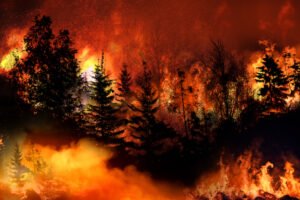According to Colorado Revised Statutes § 18-4-104, “a person who, by means of fire or explosives, intentionally damages any property with intent to defraud commits third degree arson.” This offense is treated as a class 4 felony carrying 2 to 6 years in prison.
There are 4 degrees of arson total (from most serious to least serious):
|
Colorado arson crime |
Penalties (generally) |
| First degree (CRS 18-4-102): knowingly damaging someone else’s building or occupied structure with fire or explosives. | Class 3 felony: 4 to 12 years in prison and/or $3,000 to $750,000 |
| Second degree (CRS 18-4-103): burning a building or occupied structure without the owner’s consent. | A felony, misdemeanor, or petty offense depending on the value of the endangered property |
| Third degree (CRS 18-4-104): setting fire in order to defraud someone. | Class 4 felony: 2 to 6 years in prison and/or $2,000 to $500,000 |
| Fourth degree (CRS 18-4-105): endangering someone else or their property by setting a fire. |
If someone is endangered Class 4 felony: 2 to 6 years in prison and/or $2,000 to $500,000 If no one is endangered A felony, misdemeanor, or petty offense depending on the value of the endangered property |
You could also have to pay the victim restitution for the property damage.
Examples
- George sets his banana stand on fire so he can send his insurance company a claim for money.
In this article, our Denver Colorado criminal defense attorneys will explain:
- 1. What is third-degree arson under CRS 18-4-104?
- 2. What are legal defenses to third-degree arson?
- 3. What are the penalties for a conviction under CRS 18-4-104?
- 4. Similar offenses
- Additional resources
1. What is third-degree arson under CRS 18-4-104?
Third-degree arson is laid out in CRS 18-4-104. This statute forbids intentionally damaging property with fire or explosives in order to defraud someone. It is often charged against people suspected of trying to collect insurance money.1
The factors that make arson third-degree arson are:
- The fire or explosion were intentional,
- The damage was done for the purpose of defrauding someone.

CRS 18-4-104 defines 3rd degree arson as setting fire to property with intent to defraud someone.
1.1. How much damage does there have to be?
CRS 18-4-104 requires property damage for a conviction. The property does not have to be destroyed.2 However, there has to be more than discoloration or scorch marks.3 Courts have drawn the line at a fire or explosion that ignites or changes the nature of a piece of property.4
1.2. What does it mean to defraud someone?
Part of third-degree arson is intentionally defrauding someone. Fraud involves obtaining property or money by using misleading or untruthful statements.
In the context of third-degree arson, the fraud usually happens in the insurance claim. Courts pay attention to recent insurance payments and decisions to see if there was fraud.5
2. What are legal defenses to third-degree arson?
If you have been accused of third-degree arson in Colorado, there are legal defenses you can raise. The 2 most common are:
- You did not have an intention to defraud anyone or to set the fire, and
- The fire was set by someone else.
2.1. You did not intend to set the fire or defraud
You can only be liable for third-degree arson if you intended to do 2 things:
- Damage something with a fire or an explosion, and
- Defraud someone else.
Prosecutors have to prove you had these intentions. They have to prove them beyond a reasonable doubt.
Evidence that the fire was just an accident can show you had neither intention.
2.2. It was not you who set the fire
Prosecutors also have to prove that you were responsible for the fire. You can fight this claim by presenting evidence that it was someone else.
This is the legal defense of mistaken identity.
3. What are the penalties for a conviction under CRS 18-4-104?
The penalties for a conviction of third-degree arson are serious. Violating CRS 18-4-104 is a Class 4 felony. A conviction carries:
- At least $2,000 in fines,
- Between 2 and 6 years in prison, and
- Payment of victim restitution.
A hidden penalty for a conviction for arson in the third degree is the mark it puts on your criminal background. Third-degree arson is the only arson offense that involves fraud. A conviction, therefore, is a felony-level fraud offense. Getting a job after your release is especially difficult with a prior fraud conviction.

Third degree arson carries 2 to 6 years in Colorado State Prison.
4. Similar offenses
Some offenses are similar to third-degree arson under CRS 18-4-104. Others are often charged alongside arson in the third degree. These include:
- First-degree arson (CRS 18-4-102). This involves using fire or an explosion to damage someone else’s building or occupied structure.
- Second-degree arson (CRS 18-4-103). This is the same as first-degree arson, but does not involve a building or occupied structure.
- Fourth-degree arson (CRS 18-4-105). This is the crime of starting a fire that endangers someone else or their property.
- Criminal mischief (CRS 18-4-501). This involves damaging someone else’s property without their consent. It does not require fire or an explosion.
Additional resources
For more in-depth information on arson laws, refer to these scholarly articles:
- The Evolution of Fire Investigation and its Impact on Arson Cases – Criminal Justice.
- The Metamorphosis of the Law of Arson – Missouri Law Review.
- Assessment, Treatment and Sentencing of Arson Offenders: An Overview – Psychiatry, Psychology, and Law.
- Legal Aspects of Arson – Journal of Criminal Law, Criminology & Police Science.
- The Crime of Arson – Journal of Criminal Law & Criminology.
Legal References:
- See People v. Elkhatib (Colo. 1981) 632 P.2d 275 (defendant increased his insurance coverage months before a fire, and asked for a copy of his policy 5 days before the blaze). See also citation in Magana v. People (Colo. 2022) 511 P.3d 585.
- People v. LeFebre (Colo. 1976) 546 P.2d 952.
- People v. LeFebre, Supra.
- People v. LeFebre, Supra.
- See People v. Elkhatib, Supra.
